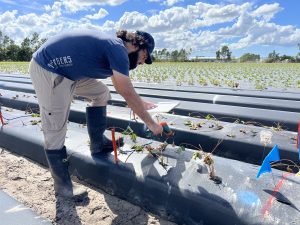As we enter the state’s strawberry-growing season, establishing young strawberry plants in the field requires substantial water. New University of Florida research shows that growers can save as much as 67% — or up to half a million gallons per acre per season by alternating sprinkler cycles on and off — and get the same yield.
The savings takes place during the firsts two weeks of the season.
As Florida’s population is expected to grow from 21.5 million to 26 million by 2040, it is critical that every drop of water is used wisely. Conserving water is also crucial for enhancing the sustainability of Florida’s $434 million-a-year strawberry industry.

Normally, growers get their bare-root transplants from places such as Canada and northern California and plant them in Florida’s strawberry heartland — Hillsborough, Polk and Manatee counties.
After being shipped to Florida — with no soil around the roots — the plants initially need extra care, particularly daytime sprinkler irrigation. That’s because their damaged roots cannot absorb enough water to support the plants’ survival and growth. It typically takes 10 to 14 days of daytime sprinkler irrigation for bare-root transplants to settle in the field.
In fact, the establishment of strawberry transplants typically requires 355,680 to 456,000 gallons of water per acre over 10 days, or more than 600,000 gallons per acre with the extended use of sprinklers, said Shinsuke Agehara, a UF/IFAS associate professor of horticultural sciences and lead investigator of the new study.
“This is a significant amount, especially considering the establishment period lasts only up to two weeks, and there are more than 14,000 acres of strawberry production in Florida,” said Agehara, a faculty member at the Gulf Coast Research and Education Center. “Using an intermittent sprinkler program can reduce water use during the establishment period by 50 to 67%.”

Results surprised scientists because they expected that alternating sprinkler cycles on and off would increase heat stress on the strawberry plants and negatively impact establishment and yield. But they saw no yield reduction.
Scientists also found that for some strawberry varieties, this method can increase yield without negatively affecting fruit quality. That includes ‘Florida Brilliance,’ which saw a 27% increase in yield in one season, using intermittent irrigation.
“Our next step is to set up an on-farm trial, so growers can see the water savings and the impact of intermittent irrigation for themselves,” Agehara said. “We would like to go beyond just academic publication. Our goal is to implement this intermittent irrigation program as a commercial standard practice for strawberry production, so we can conserve water and address practical issues.”
###
ABOUT UF/IFAS
The mission of the University of Florida Institute of Food and Agricultural Sciences (UF/IFAS) is to develop knowledge relevant to agricultural, human and natural resources and to make that knowledge available to sustain and enhance the quality of human life. With more than a dozen research facilities, 67 county Extension offices, and award-winning students and faculty in the UF College of Agricultural and Life Sciences, UF/IFAS brings science-based solutions to the state’s agricultural and natural resources industries, and all Florida residents.
 6
6
